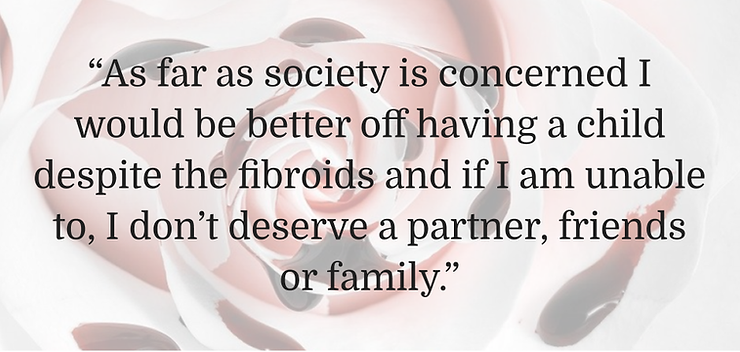“After years of suffering with intense period pains and excessive bleeding 10 years ago I was diagnosed with fibroids in the womb and underwent an operation to have them removed. I had recently got married however due to the recovery period I was unable to bear children and soon after my husband left to work abroad. As a newly wed I faced a lot of discrimination as to why I didn’t have a child immediately after getting married.
I have currently been diagnosed again with more fibroids and as I am 40,recommended to have a hysterectomy (remove my womb) due to the presence of 7 more fibroids and the intense pain I feel daily. I feel reluctant to go forth with the surgery solely because of the discrimination I endure by my husband (due to his return this October with the intention of having a child) and all my friends and family. My mother has voiced her thoughts saying she has failed as a mother and would rather die than see me barren. Friends and family have told me im useless as I can never have a child now and it would be fair for my husband to leave me. No one cares about the pain I am enduring, possible risk of cancer or the medical implications of opting not to have the surgery. As far as society is concerned I would be better off having a child despite the fibroids and if I am unable to, I don’t deserve a partner, friends or family.”
Status Quo
In most Sri Lankan communities, and indeed, society at large, the social pressure for a woman to get married and bear children outweighs all other aspects of life, including her health and mental wellbeing. According to a 2013 report by the World Bank, “women’s involvement and choices made about economic opportunities are shaped and driven by the existing deep-rooted norm of women being responsible for care-giving and housework. A good amount of life-time of a woman is spent in bearing and rearing children” (Chowdhury). So, a woman’s role as a caregiver takes precedence even over economic benefits, because the social pressure to uphold these norms is quite strong. According to this report, these societal stipulations ring true across classes, levels of education and urban and rural households, presenting itself as a more rooted, universal issue that even increased education struggles to combat. In patriarchal societies, the value placed on furthering the family lineage places children at a great importance. Bearing children becomes the duty of a married woman to her husband. Inability to have a child is a direct hit on a woman, and she is considered a failure. The qualitative research done with 28 single Sri Lankan mothers for BMC Women’s Health, states that throughout “the interviews, the women expressed fear of shame, and striving for familial and societal acceptance and financial survival.” (Jordal, Wijewardena, Olsson). Regardless of the context, this points out the general multifaceted issue of social policing via the culture of shaming; a complex and effective tool used to silence and isolate individuals to a point of conformity.
Problem
- A cultural issue of failing to see a woman’s value beyond her ability to bear children and become a good mother. The very identity of a woman is tied to roles such as mother, caregiver and wife.
- The ultimatum of either compromising her health and mental wellbeing to meet social expectations or being seen as selfish and being disowned by family for choosing her own health.
- Onerous burdens in terms of expectations placed on women, which could lead to poor mental health and have knock on effects in terms of poor outcomes in future pregnancies and children, jobs, family life etc.
- Fear of social isolation keeping women from exercising their rights and reporting issues.

Solutions and Takeaways
- Including mental health education when raising awareness about sexual and reproductive health.
- Recognising that individual’s health outweighs the social expectations and traditional gender roles. Break social stigmas by examining any negative habits in one’s personal life and nitpicking the reasons for these expectations and how to overcome associated challenges.
- Reserve judgement, progress with compassion and support to reduce the isolation of those who reach out to you regarding their health and mental health.
- Big picture solutions like government incentives to keep women employed and thereby change the norms surrounding a woman’s worth in the public and private sphere.
Written and Compiled by: Tharakie Pahathkumbura (Researcher) and Tamara Jayasinghe (Mentor). Contributor: Nilushka Perera (Researcher).
We hope to publish stories along with a problem-solution analysis, to acknowledge and create a space to benefit those who may be experiencing unspoken medical pitfalls. To respect the privacy of those who share their stories, these quotes will be kept anonymous. If you have a story of systemic failure or concern in the medical field with regards to your sexual or reproductive health, we welcome you to share your story. Email us at contact@arkainitiative.org or direct message us on Facebook or Instagram @arkainitiative, with a word count of 200 words or less.
Referrences:
Chowdhury, Afra Rahman. 2013. Low Female Labor Force Participation in Sri Lanka :
Contributory Factors, Challenges and Policy Implications (English). South Asia : human development sector discussion paper series; no. 68. Washington, DC: World Bank Group. http://documents.worldbank.org/curated/en/412071468164963293/Low-Female-Labor-Force-Participation-in-Sri-Lanka-Contributory-Factors-Challenges-and-Policy-Implications
Jordal, M., Wijewardena, K., & Olsson, P. (2013). Unmarried women’s ways of facing
single motherhood in Sri Lanka – a qualitative interview study. BMC women’s health, 13, 5. doi:10.1186/1472-6874-13-5
Cover Image: Nicolas Raymond.

